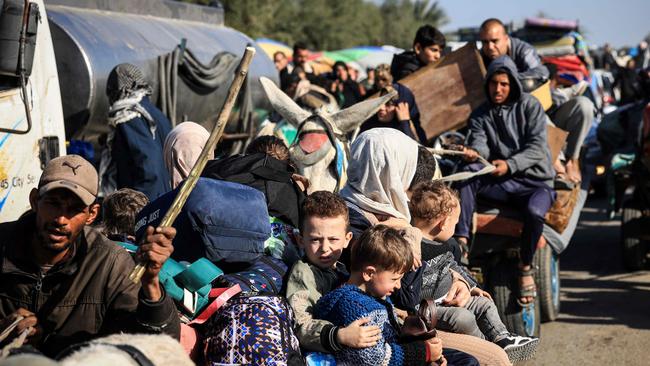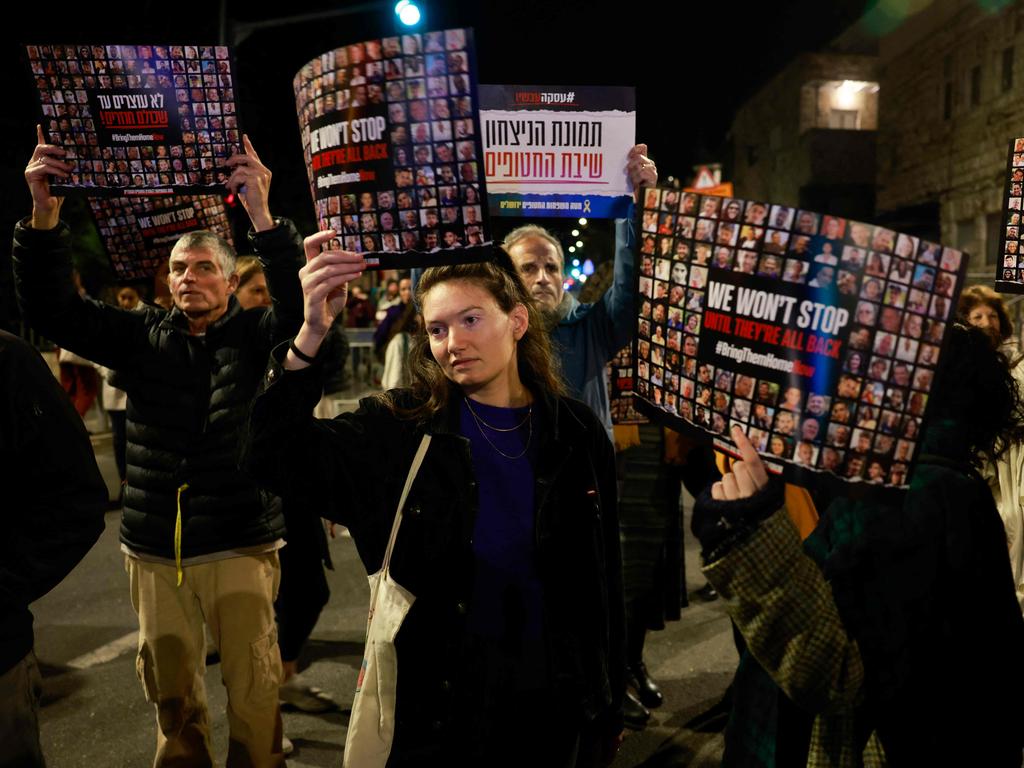Arab peace proposal to end Gaza war starts to take shape
Plan, which has been rejected by Israel, envisions pathway for creation of Palestinian state.

Arab countries are working on a proposal for post-war Gaza that would create a pathway toward a Palestinian state in exchange for Saudi recognition of Israel, according to Arab officials.
The proposal, submitted to Israel via the US, is the first joint plan by Arab states to end the war in Gaza and set a pathway toward a two-state solution. Saudi Arabia, which is one of five Arab countries making the proposal, is offering to normalise ties with Israel in return, a process derailed by the Hamas-led attack on October 7.
The proposal is still being finalised, according to Saudi and Egyptian officials, but has so far been rejected by Israel’s government, with the creation of a Palestinian state the main sticking point.
Israeli officials didn’t immediately respond to requests for comment. White House National Security Council spokesman John Kirby declined to comment. “I’m obviously not going to try to negotiate here from the podium,” he told reporters at the White House on Monday. He said the U.S. continues to be in touch with its counterparts and allies “about trying to get those hostages out, trying to get the appropriate humanitarian pause in place so that we can do that and get additional aid in, as well as making sure that Israel has what it needs to defend itself.” The news emerged amid a renewed flurry of diplomatic activity from U.S. and European officials seeking to stop the fighting. President Joe Biden’s top Middle East adviser, Brett McGurk, arrived in the region Monday to discuss the war and the fate of Israeli hostages, meeting Egyptian officials in Cairo before heading to Qatar, said Egyptian officials. In Brussels, the European Union’s top diplomat, Josep Borrell, led a group of foreign ministers meeting senior Arab officials and, separately, Israeli Foreign Minister Israel Katz.
At the meeting with EU foreign ministers, people involved in the discussion said the two sides talked past each other. EU foreign ministers pressed for Israel’s plans for Gaza after the conflict and for its approach to a two-state solution. Katz didn’t significantly address those issues, instead showing his counterparts two videos that touted possible projects for boosting Gaza’s economy.
In a news conference late Monday, Borrell said the videos “had little or nothing to do with the issues we were discussing.” He said Katz would have “better taken advantage of his time” by focusing on the “security of his country and the death toll in Gaza.” Israel’s ambassador to the EU, Haim Regev, noted that Katz had used his first trip abroad since resuming the post to come to the EU. “It was for us a very important engagement,” he said.
The efforts by McGurk, EU and Arab officials come as Israel is under mounting international and domestic pressure to lay out a plan for who will rule post-war Gaza and who will pay for its reconstruction.
The war has taken a devastating toll on Gaza’s 2.2 million residents, most of whom are now internally displaced and are facing a shortage of food, medicines and clean water, among other basic goods. Over 25,000 people, the majority of whom are women and children, have been killed in Gaza since the start of hostilities, according to Palestinian authorities. Those figures don’t distinguish between combatants and civilians.
The Israeli invasion followed the Hamas-led attack on Israel on Oct. 7, in which about 1,200 Israelis were killed, most of them civilians. On Monday, the Israeli military said 200 Israeli soldiers had been killed in Gaza since the start of the invasion.
International pressure is mounting on Israel to alter its conduct of the war or wrap it up altogether.
The Israelis have said they want Gulf countries to play a leading role in rebuilding the enclave, but those countries have pushed back unless there is a clear pathway toward a two-state solution.
The Arab plan is on a separate track from negotiations over the release of more than 130 Israeli hostages still being held by Hamas, the Arab officials said. Israeli Prime Minister Benjamin Netanyahu said Sunday that he turned down a proposal by Egypt, Qatar and the U.S. to end the war in return for the remaining hostages, characterising it as a surrender.
Egyptian officials said various Israeli proposals for hostage releases — including a two-month pause in fighting as part of a multiphase deal that would include the release of all remaining hostages held in Gaza — have been already rejected by Hamas. Egyptian officials said that the country’s top negotiator, its intelligence chief, Abbas Kamel, accused Israel’s team of not being serious about the talks and said any proposal that doesn’t include a permanent ceasefire wouldn’t be taken seriously by Hamas.
The families of Israelis still held hostage have been trying to increase pressure on the government to accept a deal. On Monday, families of hostages and one freed hostage stormed the Knesset’s finance committee bringing their deliberations to a halt.
“They can’t be sitting there while the hostages languish in captivity. We demanded that they stop everything and bring everyone back or we will paralyse the country,” said Gil Dickmann, one of the protesters who has a family member hostage in Gaza. Idit Ohel, whose son Alon is a hostage, said she supported the protest’s agenda. “The war won’t necessarily bring the hostages home,” she said. “We have to find some kind of negotiation to obtain [their] release.” The plan proposed by the five Arab countries also addresses what should happen in Gaza in the immediate aftermath of the war. Arab countries are pushing back against an Israeli request for them to take over direct responsibility for reconstruction and security of the strip when and if Hamas is removed from power, arguing it is Israel’s responsibility to do so.
Arab countries are proposing to train Palestinian security forces, to assist with reviving and reforming the unpopular Palestinian Authority and to eventually help organise elections, Arab officials say. Netanyahu has said that he won’t allow the Palestinian Authority to play a role in post-war Gaza. The U.S. has advocated a reformed Palestinian Authority. Palestinian Authority President Mahmoud Abbas has given no sign he is prepared to give up power.
Arab officials are still working on the plan, which they hope to finalise in coming weeks, said the Saudi and Egyptian officials.
Above all, Israeli officials are unwilling to accept the plan’s main condition: the creation of an independent Palestinian state. Netanyahu has repeatedly rejected that possibility, a position shared by many Israelis. On Sunday, he said Israel wouldn’t agree to end the war against Hamas in exchange for the hostages.
“If we agree to this, then our warriors fell in vain,” he said in a statement on Sunday. “I am not prepared to accept such a mortal blow to the security of Israel.”
The Wall Street Journal




To join the conversation, please log in. Don't have an account? Register
Join the conversation, you are commenting as Logout